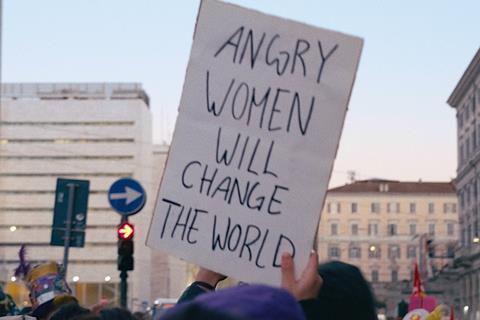Elina Psykou explores how issues of IVF, abortion and euthanasia are treated differently across Europe

Dir: Elina Psykou. Greece/Switzerland/Italy/Bulgaria. 2024. 109mins
Matters of life, death, borders and religion are provocatively considered by Elina Psykou in her sometimes playful, often moving debut documentary. The filmmaker, who previously made fiction features The Eternal Return Of Antonis Paraskevas and the Tribeca jury award-winning Son Of Sofia, zones in on some of the world’s most contentious subjects: the right to die by assisted suicide, abortion and IVF treatment. While many documentarians might have solely come at this from a first-person perspective, Psykou opens up these fields for debate, also giving a voice to those who disagree with the freedom to choose these options.
Stray Bodies’ most complex and moving scenes centre on assisted suicide in Zurich
The fact that Stray Bodies is built upon individual testimonies of those seeking that freedom may indicate which side of the debate Psykou is on, but her decision to include alternative opinions makes for a more robust documentary that does not shy away from complexity. After its world premiere in competition at Thessaloniki Documentary Film Festival, it will screen in competition at CPH:DOX and is likely to attract more festival interest – particularly as it doesn’t simply focus on a single country or issue, although footage of an assisted suicide might make it a tougher sell.
The European Union may be a collective, at least in economic terms, but from an ethical perspective the boundaries are flexible, often leading those who want medical procedures that are illegal in their homeland to seek them abroad. Among them is Robin, a young Maltese woman who became pregnant after a one-night stand and is now heading to Sicily to have the abortion she cannot legally acquire in Malta. Meanwhile, Italians Katerina and Gaia are travelling to seek IVF treatment for the babies they want in Greece, because single women are not allowed the procedure at home. Through the course of this film we’ll also meet people journeying to Switzerland to end their lives, and the doctor who helps them.
Psykou sets out her stall with a game, asking various participants for one-word “associative” answers to topics including IVF, euthansia and religion. The inclusion of religion is something the filmmaker will return to repeatedly, questioning – either overtly or more obliquely – the impact Christianity has had on countries’ laws and, at times, suggesting a sort of theological cognitive dissonance.
Christian iconography is particularly noticeable in the segment concerning Robin, as Psykou highlights statues, paintings and even waiting room magazines that have a religious element. We’ll also meet a deacon who speaks about his horror at realising aborted babies were disposed of as medical waste, and a monk who is reliant on round-the-clock care and speaks via a computer but who views euthanasia as “a great tragedy”.
As the various participants cross country borders for the medical services they want, Stray Bodies nudges at contradictions. The celebration of Mary’s ‘virgin’ birth seems to clash with a Christian who claims IVF permits a sort of eugenics, or single mums being denied the treatment in Italy – which in 2016 ran a highly controversial ’Fertility Day’ campaign. (The very nature of some of its reproductive subject matter makes this a female-centric film, although Psykou also includes a meaningful aside concerning disability and sperm donation.)
Stray Bodies’ most complex and moving scenes centre on assisted suicide in Zurich. The physician who has helped many patients contemplates the suggestion that she is “playing God”, noting that she is also doing that if she helps someone with antibiotics or stents to prevent them from dying. A Greek doctor who watched her own mother die of brain cancer is visibly moved as another elderly woman makes the choice to end her life with the help of her son. This is not easy to watch, but it sensitively handled by Pyskou.
If the segments involving abortion don’t feel quite as ‘authentic’ as the rest of Stray Bodies, credits reveal that ’due to the real risk of imprisonment facing women in Malta who have abortions, the events of this particular story were re-enacted for the film’ and based on testimony. A statement which, in itself, gives pause for thought. Psykou mitigates this restaging somewhat by making the section with Robin feel more experimental in general, including a dance sequence set to Madonna’s ‘Papa Don’t Preach’, which partially takes place in a church.
“What if there is a cure?,” a woman seeking assisted dying is asked. “Every choice is a risk,” she replies. Psykou eloquently makes the case that the decision to take that risk iies with an individual, not the church or state.
Production companies: Jungle Films, Contrast, DocLab, Red Carpet
International sales: Cinephil info@cinephil.com
Producers: Antigoni Rota, Ivan Madeo, Marco Visalberghi, Veselka Kiryakova
Cinematography: Nikolas Karanikolas
Editing: Nikos Vavouris






![The Brightest SunScreen[Courtesy HKIFF]](https://d1nslcd7m2225b.cloudfront.net/Pictures/274x183/3/5/0/1448350_thebrightestsunscreencourtesyhkiff_312678.jpg)















![The Brightest SunScreen[Courtesy HKIFF]](https://d1nslcd7m2225b.cloudfront.net/Pictures/100x67/3/5/0/1448350_thebrightestsunscreencourtesyhkiff_312678.jpg)

